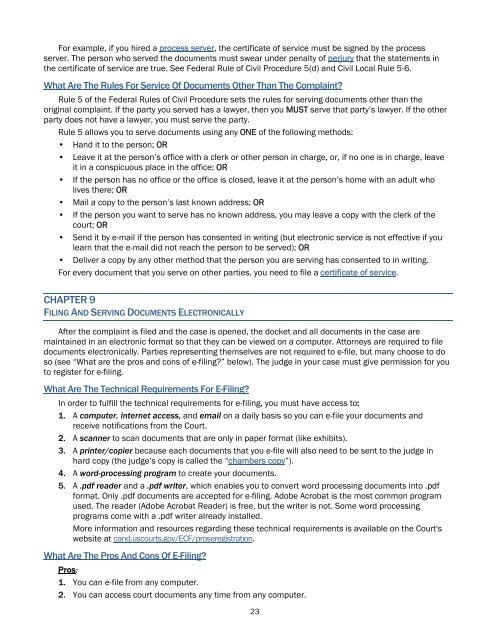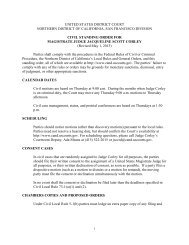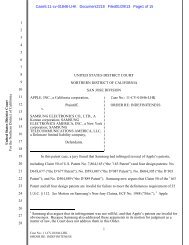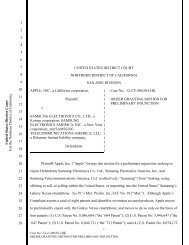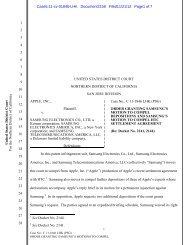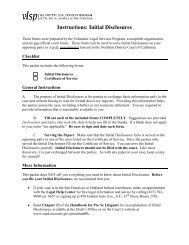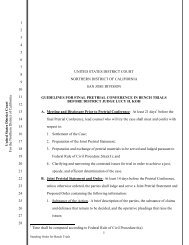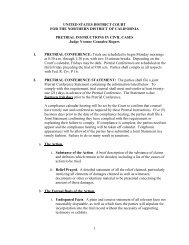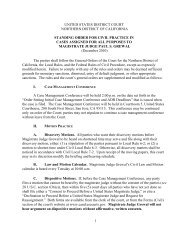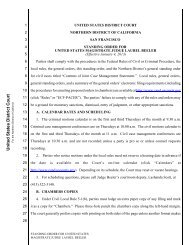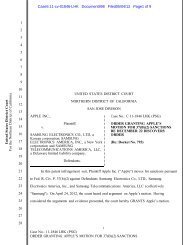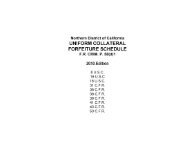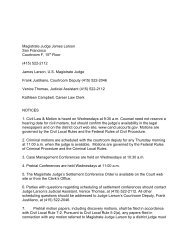Representing Yourself in Federal Court - United States District Court ...
Representing Yourself in Federal Court - United States District Court ...
Representing Yourself in Federal Court - United States District Court ...
You also want an ePaper? Increase the reach of your titles
YUMPU automatically turns print PDFs into web optimized ePapers that Google loves.
For example, if you hired a process server, the certificate of service must be signed by the process<br />
server. The person who served the documents must swear under penalty of perjury that the statements <strong>in</strong><br />
the certificate of service are true. See <strong>Federal</strong> Rule of Civil Procedure 5(d) and Civil Local Rule 5-6.<br />
What Are The Rules For Service Of Documents Other Than The Compla<strong>in</strong>t?<br />
Rule 5 of the <strong>Federal</strong> Rules of Civil Procedure sets the rules for serv<strong>in</strong>g documents other than the<br />
orig<strong>in</strong>al compla<strong>in</strong>t. If the party you served has a lawyer, then you MUST serve that party’s lawyer. If the other<br />
party does not have a lawyer, you must serve the party.<br />
Rule 5 allows you to serve documents us<strong>in</strong>g any ONE of the follow<strong>in</strong>g methods:<br />
• Hand it to the person; OR<br />
• Leave it at the person’s office with a clerk or other person <strong>in</strong> charge, or, if no one is <strong>in</strong> charge, leave<br />
it <strong>in</strong> a conspicuous place <strong>in</strong> the office; OR<br />
• If the person has no office or the office is closed, leave it at the person’s home with an adult who<br />
lives there; OR<br />
• Mail a copy to the person’s last known address; OR<br />
• If the person you want to serve has no known address, you may leave a copy with the clerk of the<br />
court; OR<br />
• Send it by e-mail if the person has consented <strong>in</strong> writ<strong>in</strong>g (but electronic service is not effective if you<br />
learn that the e-mail did not reach the person to be served); OR<br />
• Deliver a copy by any other method that the person you are serv<strong>in</strong>g has consented to <strong>in</strong> writ<strong>in</strong>g.<br />
For every document that you serve on other parties, you need to file a certificate of service.<br />
CHAPTER 9<br />
FILING AND SERVING DOCUMENTS ELECTRONICALLY<br />
After the compla<strong>in</strong>t is filed and the case is opened, the docket and all documents <strong>in</strong> the case are<br />
ma<strong>in</strong>ta<strong>in</strong>ed <strong>in</strong> an electronic format so that they can be viewed on a computer. Attorneys are required to file<br />
documents electronically. Parties represent<strong>in</strong>g themselves are not required to e-file, but many choose to do<br />
so (see “What are the pros and cons of e-fil<strong>in</strong>g?” below). The judge <strong>in</strong> your case must give permission for you<br />
to register for e-fil<strong>in</strong>g.<br />
What Are The Technical Requirements For E-Fil<strong>in</strong>g?<br />
In order to fulfill the technical requirements for e-fil<strong>in</strong>g, you must have access to:<br />
1. A computer, <strong>in</strong>ternet access, and email on a daily basis so you can e-file your documents and<br />
receive notifications from the <strong>Court</strong>.<br />
2. A scanner to scan documents that are only <strong>in</strong> paper format (like exhibits).<br />
3. A pr<strong>in</strong>ter/copier because each documents that you e-file will also need to be sent to the judge <strong>in</strong><br />
hard copy (the judge’s copy is called the “chambers copy”).<br />
4. A word-process<strong>in</strong>g program to create your documents.<br />
5. A .pdf reader and a .pdf writer, which enables you to convert word process<strong>in</strong>g documents <strong>in</strong>to .pdf<br />
format. Only .pdf documents are accepted for e-fil<strong>in</strong>g. Adobe Acrobat is the most common program<br />
used. The reader (Adobe Acrobat Reader) is free, but the writer is not. Some word process<strong>in</strong>g<br />
programs come with a .pdf writer already <strong>in</strong>stalled.<br />
More <strong>in</strong>formation and resources regard<strong>in</strong>g these technical requirements is available on the <strong>Court</strong>'s<br />
website at cand.uscourts.gov/ECF/proseregistration.<br />
What Are The Pros And Cons Of E-Fil<strong>in</strong>g?<br />
Pros:<br />
1. You can e-file from any computer.<br />
2. You can access court documents any time from any computer.<br />
23


